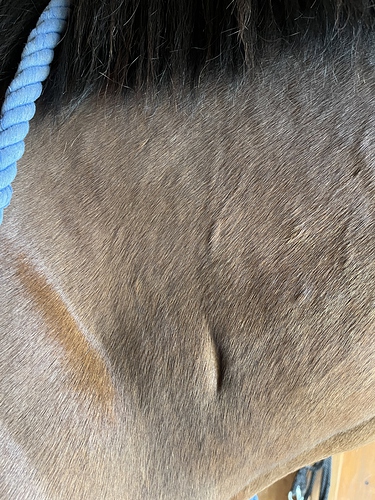Short version: are neck injections worth trying for a horse that shows some signs of neck pain but has clean X-rays/ultrasounds? Shockwave has already been done with no improvement.
This is regarding my 15-yo TB eventer who suffers from sleep-deprivation (original thread here: Sleep deprivation in the dominant/hypervigilant horse UPDATE 11/4). The summary is that last May I had an internal medicine specialist examine him thinking maybe he had ulcers or another gut health issue, but she zeroed in on his neck and back being painful. His neck ultrasound was clean and at worst two sets of X-rays (one in the field and one at New Bolton) showed “equivocal mild enlargement of the C3-4, 4-5, 5-6 and 6-7 vertebrae, thought to most likely represent normal age related change as opposed to true osteoarthropathy, and mild nuchal enthesopathy (incidental). Intra- and intervertebral sagittal ratios were within normal limits, not suggestive of narrowing of the spinal canal.” He’s not a touchy-feely guy but no other vet has been able to replicate the pain responses the first vet got on neck/back palpation. New Bolton wasn’t overly concerned about neck/back either, though they noted low/stiff neck carriage, which is also part of what the first vet noted. They found ulcers that were treated successfully according to re-scope but with no changes in behavior with treatment.
My regular vet has shockwaved his lower neck three times this spring at 2-week intervals and said if it were going to help it would have by now. He does react to the shockwave, mostly on the right side in the C6/7 area, with muscle twitching and other pain signs, so I asked about injections at the last shockwave treatment and my vet said I could try them but he’d want me to ship to a clinic. Is this worth trying? On the one hand there’s no known pathology. On the other he does seem to be painful there and I’m not sure what else to do.
He got 3 months of just hacking over the winter and is now back in full work. He’s going and jumping well. He’s never been an elastic mover or super soft/straight in the contact in dressage, so it’s tough to say if there’s an issue we just haven’t found. I’ve frequently gotten the “that’s just him” line from vets and trainers. He had a pre-season soundness check and the vet said he looked great and to keep doing what I’m doing.
I still think his refusal to lie down for more than a couple minutes at a time is largely about herd dynamics, but there does seem to maybe be some lower neck pain too. The question is whether it’s worth trying to treat. Any thoughts?


 just a sports medicine vet’s opinon and each is on a case by case basis ( that is my disclaimer for her ha ha) . It also depends on the progression and actual cause)
just a sports medicine vet’s opinon and each is on a case by case basis ( that is my disclaimer for her ha ha) . It also depends on the progression and actual cause)